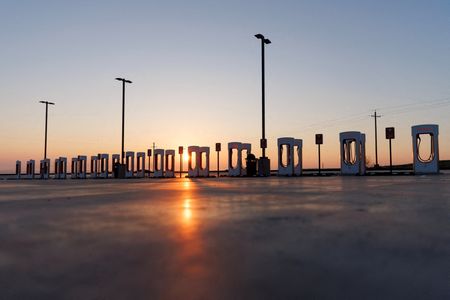(Reuters) – The Biden administration on Wednesday issued long-awaited final rules on its national electric vehicle charger network that require chargers to be built in the United States immediately, and with 55% of their cost coming from U.S.-made components by 2024.
The White House seeks to give consumers unfettered access to a growing coast-to-coast network of EV charging stations, including Tesla Inc’s SuperChargers. Companies that hope to tap $7.5 billion in federal funding for this network must also adopt the dominant U.S. standard for charging connectors, known as “Combined Charging System” or CCS, and use standardized payment options that are smartphone-friendly.
REACTIONS:
SCOTT PAUL, PRESIDENT OF THE ALLIANCE FOR AMERICAN MANUFACTURING
“This announcement represents significant progress and the results are already clear. Manufacturers are investing in the U.S., creating jobs and making a domestic supply chain possible that would not otherwise have occurred. Made in America EV chargers are no longer a rhetorical policy aspiration but a reality.”
ANNE SMART, VICE PRESIDENT OF GLOBAL PUBLIC POLICY AT CHARGEPOINT, AN OPERATOR OF CHARGING STATIONS
“Today, the United States took a major step forward in its efforts to electrify transportation for all Americans. With these minimum standards finalized, states can now launch their programs to build EV charging infrastructure — and we are already working with partners across the country to identify ideal sites, attract private capital, and set in motion the plans for installing and maintaining the charging stations that will power our new electric transportation system for years to come.”
KEVIN DEMPSEY, PRESIDENT AND CEO OF THE AMERICAN IRON AND STEEL INSTITUTE
“The domestic steel industry is prepared to play a strong role in the expansion of our national EV charging infrastructure. Enabling our American steel companies to lead the way in supplying clean steel for EV charging infrastructure will help meet the administration’s goals of lowering GHG (greenhouse gas) emissions while strengthening the nation’s supply chain to support clean energy.”
JONATHAN LEVY, CHIEF COMMERCIAL OFFICER OF CHARGING STATION OPERATOR EVGO
“We’ve been working with our manufacturers, and they’ve been working to onshore their capacity. We’re still figuring out if they can meet it this quickly – because we assumed there was at least going to be some runway.”
“It was a surprise to us that they would require assembly immediately given that domestic manufacturing for high-power charging infrastructure is starting basically from scratch. And the supply chain is very constrained.”
“We’re still dealing with very long lead times from our suppliers on existing production facilities. And we are concerned that it’s going to take some time for the capacity to ramp up.”
BRENDAN JONES, PRESIDENT AT CHARGING STATION OPERATOR BLINK CHARGING
“These rules are absolutely in line with Blink’s expectations. As the industry standard, Blink deploys the CCS nationwide to ensure convenient access to direct current (DC) fast chargers. CCS is readily available across our product line of DC fast chargers.”
EV MAKER FISKER
“Fisker supports a strategy that allows all charging providers to expand the charging network across the U.S. as fast as possible. These new rules seems to be in line with that goal.”
“We believe the CCS strategy is absolutely right, as it gives all EV drivers the ability to charge wherever they go. We believe that this supports our greater objective with regard to the mass adoption of electric vehicles”
EV MAKER RIVIAN
“These rules will increase the proliferation of consistent, high-quality EV charging, accelerate EV adoption, and support continued investment from US-based manufacturers like Rivian.”
EV CHARGERS NETWORK OPERATOR ELECTRIFY AMERICA
“Electrify America … is currently reviewing the rules outlined by the Federal Highway Administration related to chargers to be used in federally-funded installations.”
“The company plans to expand its public charging network to 1,800 charging stations and 10,000 individual chargers in the United States and Canada by 2026.”
(Reporting by Jarrett Renshaw, Hyunjoo Jin, Ben Klayman, Akash Sriram and Samrhitha Arunasalam; Compiled by Aditya Soni; Editing by Krishna Chandra Eluri and Uttaresh.V)

